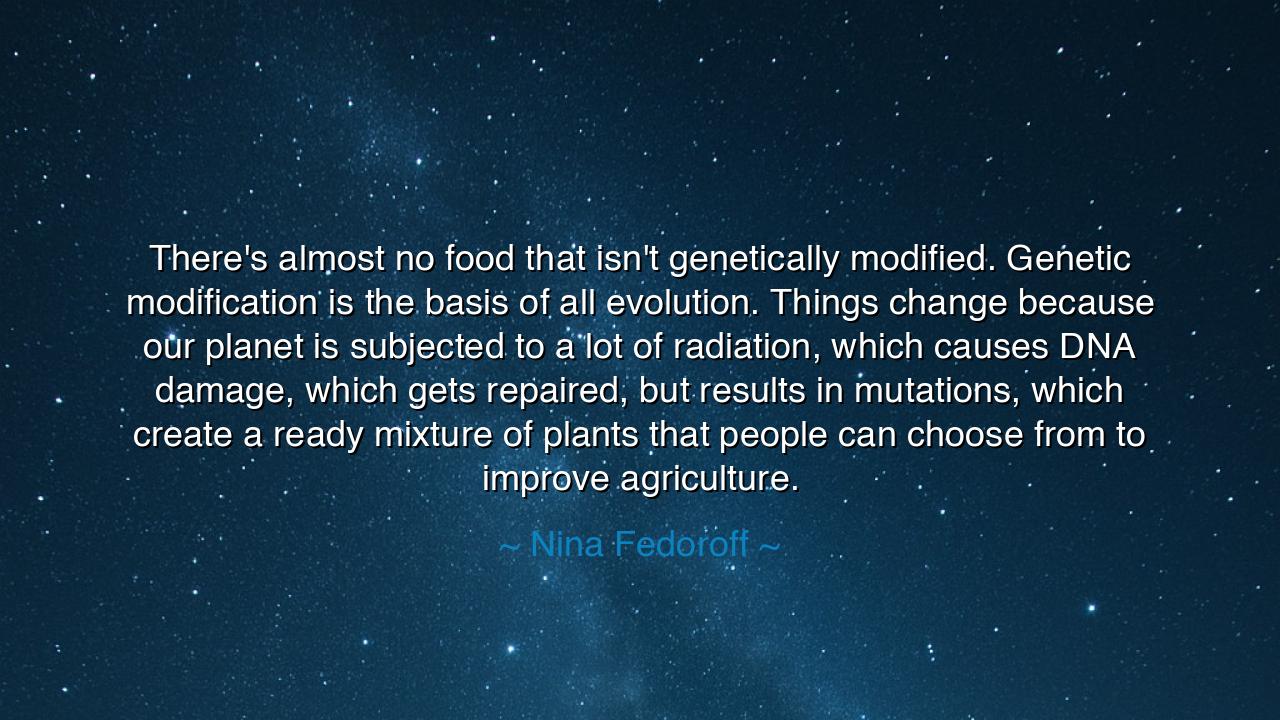
There's almost no food that isn't genetically modified. Genetic
There's almost no food that isn't genetically modified. Genetic modification is the basis of all evolution. Things change because our planet is subjected to a lot of radiation, which causes DNA damage, which gets repaired, but results in mutations, which create a ready mixture of plants that people can choose from to improve agriculture.






Host: The room was quiet, the evening light casting a warm glow across the space. Jack sat near the window, his fingers lightly tapping on the armrest, lost in thought. Jeeny, across from him, was curled up in her chair, a book in her lap, though her attention seemed to be focused on the conversation about to unfold. The peaceful silence felt like the perfect backdrop to discuss something both fascinating and complex.
Host: Nina Fedoroff’s words filled the space: “There’s almost no food that isn’t genetically modified. Genetic modification is the basis of all evolution. Things change because our planet is subjected to a lot of radiation, which causes DNA damage, which gets repaired, but results in mutations, which create a ready mixture of plants that people can choose from to improve agriculture.” The scientific depth of the statement, paired with its implications for how we view genetic modification in food, seemed like an invitation to explore the relationship between nature, evolution, and human intervention. Jack, who often approached things from a practical perspective, was the first to respond.
Jack: His voice was thoughtful, almost intrigued: “It’s fascinating when you think about it this way—genetic modification isn’t just something humans do; it’s been happening naturally all along. The planet is constantly exposed to radiation, which causes DNA mutations, and that’s how evolution works. So, genetic modification in food is just a more directed form of that process. We’re taking what nature has already been doing and applying it to improve agriculture.”
Jeeny: She nodded slowly, her voice gentle, but filled with insight: “Exactly. We often think of genetic modification as a modern invention, something that we do in laboratories, but it’s a natural part of evolution. The idea that radiation causes mutations, which then lead to new traits in plants, is something that’s been going on for millions of years. What we’re doing now with genetic modification is just speeding up the process and making it more targeted to benefit agriculture, which in turn benefits food production.”
Host: The room seemed to grow a little heavier, as if Fedoroff’s words had uncovered something deeper about how genetic modification fits into the broader context of life on Earth. The idea that what we consider to be “unnatural” is actually a natural part of evolution felt both liberating and grounding. Jack, who often focused on the more immediate implications of technology and science, seemed to reflect on how deeply intertwined human innovation is with the natural world.
Jack: His voice softened, almost reflective, as he continued: “Maybe that’s the real shift in thinking—genetic modification doesn’t have to be something we fear. It’s part of the ongoing process of change that happens naturally. We’ve just learned how to harness that power for our benefit, to make agriculture more efficient and resilient. We’re not tampering with nature; we’re working alongside it, taking advantage of the same forces that have driven evolution for eons.”
Jeeny: Her smile deepened, her voice reassuring, filled with understanding: “Exactly. It’s easy to get caught up in the fear of playing god or manipulating nature, but what Fedoroff is saying is that we’re just speeding up a process that’s been happening all along. We’re applying science to something that evolution has been doing for millions of years. In many ways, genetic modification in food is just another step in the long history of life adapting and evolving.”
Host: The conversation seemed to open up a new perspective, where genetic modification was no longer viewed as something foreign or unnatural, but as a natural progression in the ongoing evolution of life on Earth. Jack and Jeeny sat together, realizing that genetic modification is a continuation of the very process that drives life forward, and it’s not about replacing nature, but working with it to improve what already exists.
Jack: His voice was now calmer, almost with a sense of understanding: “Maybe that’s the most important takeaway. Genetic modification isn’t a break from nature—it’s part of the same process of evolution. We’re not doing something unnatural; we’re just using the tools at our disposal to improve the systems that have always been in motion.”
Jeeny: She nodded, her expression filled with peace and affirmation: “Exactly. We’re part of the same natural world, and when we use science to enhance what nature has already started, we can improve our ability to grow food, solve problems, and make the world a better place for everyone. Genetic modification is just another way of being a part of that ongoing process.”
Host: The evening continued, but the world outside seemed distant now. Inside, Jack and Jeeny sat in the quiet realization that genetic modification, while often viewed as a modern invention, is a natural extension of the evolutionary process that has always been at work on Earth. It’s not something separate from nature—it’s a tool we’ve learned to use in harmony with the forces that have shaped life for millions of years. And in that, there is potential for growth and positive change.






AAdministratorAdministrator
Welcome, honored guests. Please leave a comment, we will respond soon